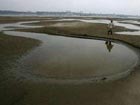| Videos | ? Latest |
|
? Feature | ? Sports | ? Your Videos |
WWF: Climate change damaging Yangtze basin
The international environmental organization WWF says that climate change is having enormous impact on China's Yangtze River basin. In its latest report released on Tuesday, the WWF urges China to implement a series of adaptive measures to deal with the effects of climate change on the region's fragile ecosystem.

According to the WWF report, temperatures across the Yangtze River basin could increase by one and a half to two degrees Celsius over the next 50 years. Meanwhile, more frequent extreme weather events, such as droughts, floods and storms are expected to batter the region.
The report says this will directly impact agriculture, the ecosystem and social and economic development in the Yangtze basin. Rice production, for instance, could decrease up to 41 percent by the end of the century.
James Leape, Director General of WWF International, said, "We've been looking at every context of what climate change will mean for the natural resources which we depend on. And of course there is no more important place than the Yangtze basin. It's home to one-third of the country's population and 40 percent of GDP. So the report is really an important step forward in understanding what climate change will mean for the Yangtze basin. How we will need to do to be able to adapt to the change that is in store for us."
Doctor Xu Ming, the lead researcher of the report, says global warming and human activity are the main threats to the river basin's eco-environment. But he rejects the view that the Three Gorges project is the main cause.
Dr. Xu Ming, from Chinese Academy of Science, said, "The impact of the Three Gorges project is quite limited and can only change the climate in some parts of the river basin. It's not the cause of the floods and droughts in recent years. We couldn't draw such a conclusion. At least there's no proof so far to come to this conclusion."
Experts say improving the river basin's ability to adapt to climate change is of strategic significance. The specific adaptation measures they recommend in the report include strengthening the existing infrastructure, improving integrated river basin management, switching to more flexible crop systems and reducing human impact on fragile ecosystems.

 0
0 






